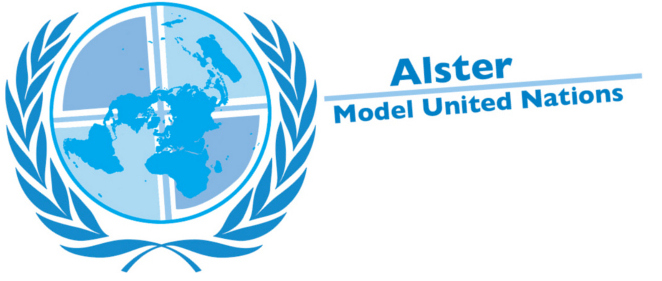Wednesday, 18thSeptember 9:50 am in the hallways of the Klosterschule– When looking around you see chatting delegates with excited faces, some are classmates and some are new faces that might become your closest allies or fiercest opponents during the upcoming debates. There is one noticeable feature, which is characteristic for high level conferences: The colors look rather… joyless… Most of the participants are dressed in black and white colors (please refrain from comments like “white is not a color”!) and you can only find a few daring delegates that chose to go down the less travelled path of a grey or even blue or red (!!) blazer or blouse. Standing out from this ocean of muted colors are the six flags hanging down from the ceiling of the school auditorium. The big five and the UN flag are a reminder that life is not black and white and that politics certainly isn’t either. It is ironic how we choose to dress in black and white when the upcoming discussions are everything but that: they are red, green, yellow and blue – heated, prosperous, enlightening and above all working towards common solutions and peace under the blue of the UN flag.
After everyone is seated and a quick roll call ensures the presence of every delegation, Ms. Corinna Nienstedt takes the floor and welcomes everyone to the city of Hamburg, the hometown of AMUN. Ms. Nienstedt holds the casual title of Head of Office of the State of the Free and Hanseatic City of Hamburg. She soon addresses the elephant in the room and gives an answer to a question every foreigner and probably also a lot of the locals have asked themselves but never dared to speak out loud: Is there a connection between citizens of Hamburg and fast food and if so, will there be burgers for lunch? Well yes, the invention of hamburgers can actually be traced back to immigrants from Hamburg who were in need of a quick and easy snack. And no, as it turns out later there will be no hamburgers for lunch today but – anonymous sources have revealed – later in the week. Also, there will be pizza at the evening event later that day. We sense some irony there.
In the following, Mr. Thomas Olliges, the vice principal of the Klosterschule, approaches the floor. He goes on to speak about how political elites don’t act in our favor and how today’s youth acts as a role model for some politicians in the world right now. No pressure though.
David Jacob, an AMUN Alumni, is living proof of what MUNs will do to you if you ignore all the alerting signs of stress and sleepless nights while organizing an MUN or writing your position paper. It will transform you. Transform you into a “left-school-years-ago-but-voluntarily-shows-up-anyway-to-do-it-all-again-and-again”-kind of person.
This leads us to the question: Is there still hope for us and people like the Conference Managers Yoko Blunck and Emil Schnapauff or the Secretaries General Julia Kranz and Paul Veit? Only time will tell but they do show all the early symptoms of agreeing to overwhelming responsibilities without hesitation and managing ten different things at the same time. Well, they are doing a great job! They encourage us to “fight with our words and be prepared to make compromises” and remind us that “only those who speak up can be heard”. Makes sense, right?
The PGA Hannah Ickes brought her own little version of the UN peace bell. She says that when it comes to peace the bell can’t be big enough and even though hers is small, we all get the picture.
Next, there is an unconventional item on the agenda: Do we want to join the global Fridays for Future demonstration on Friday? After some passionate speeches in favor and against there is a clear majority in favor and it is decided. AMUN 2019 will join the demonstration and stand up for our future.
Now it is time for the opening speeches of the ambassadors of the delegations. Some ambassadors add their personal touch by e.g. holding or wearing the national flag like Iraq and Venezuela did and ten delegates hoped for fruitful debates.
With some final words by the PGA, the Opening Ceremony comes to an end.
So, why is it that we are asked to follow the dress code? Well, maybe it is because we are not here to stand out, to push for our country’s personal agenda at the costs of others or to show off our wealth and sense of fashion. We are here to unite, to show that we are equal and willing to compromise. Be it in the sense of the color selection of our fashion or the way that we work towards solutions for the pressing issues on our agenda.
